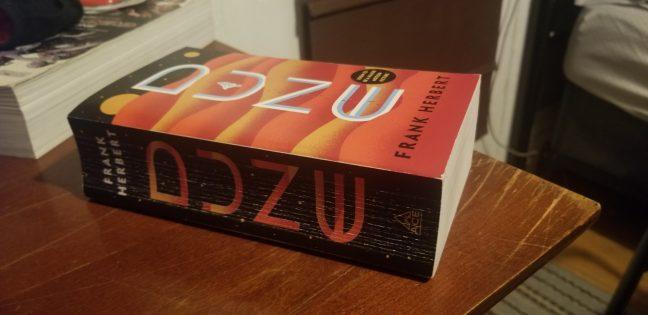With its vast world building and incredible depth of plot, “Dune” by Frank Herbert is arguably one of the most expansive science fantasy books ever written. Ever since its publishing in 1965, the book has gone on to receive critical acclaim, winning the Hugo award for best sci-fi book in 1966 and amassing a cult following comparable to other literary titans such as that of “Lord of the Rings.”
Given this level of success, one would be quick to assume “Dune” is a monumental achievement in literature, but anyone who has read the book will be quick to tell you that this is not necessarily the case.
While its author Frank Herbert was certainly a visionary in the sheer scale of his vision for the book, it is clear he is not so gifted as a writer as “Dune” suffers from a number of shortcomings that make it more of a chore to read than most books.
The book is an incredibly dense read, spanning over 800 pages of dry politics, foreshadowing and character development, skimping on what could have been a very dramatic and compelling plot.
Luckily, these attributes did not hinder Dune’s long term success, as the book has persisted as a mainstay in science fiction reading for years, spanning audiences of all generations.
But the recent release of “Dune” on the silver screen marks a number of triumphs in the continual storytelling of “Dune” as creators have tried and failed to properly do the story justice numerous times in the past. The most notable of these was a 1984 film adaptation, which flopped at the box office, earning back just $30 million of its original $40 million budget.
While it remains to be seen how “Dune“ will succeed in the long term, it is safe to say this version of the story looks primed for success as the movie soars in a number of areas where its source material could not deliver on its own.
Most notable of these successes of the film is in its score. The music in “Dune“ is nothing short of impeccable, due mostly to the brilliant work of its composer Hans Zimmer, who was actually a fan of “Dune” prior to signing on to the movie. Zimmer, whose work has previously been featured in franchises such as “Pirates of the Caribbean,” “Batman” and “James Bond,” took special consideration in putting together the score by incorporating a vibrant, yet alien feel to his compositions.
This level of care is readily apparent throughout “Dune,” as the film is ripe with fluttering melodies and throaty bass tones, instantly conveying to the viewer the sense of wonder Herbert intended for “Dune” to have.
Also worth considering were the film’s visuals, which made it apparent that the producers spared no expense in putting together the rich world of Dune. From the shifting sands of the desert, to the high mountain cliffs and colorful sky, “Dune” is as equally enjoyable to look at as it is to listen to. The CGI is also top notch, portraying otherworldly alien characters, terrifying killer sandworms and intense explosions throughout the film’s two hour 35 minute runtime.
Another success for the film came in its casting, allowing skilled actors to deliver stellar performances in many key roles throughout the film. Stephen McKinley was a perfect match for the robotic nature of his character Thufir Hawat, Oscar Isaac makes for a poised but emotional Leto Atreides and Josh Brolin’s portrayal of Gurney Halleck seems to fit instantly with the way his character was portrayed in the books.
For these reasons — and a number of others — it is safe to say “Dune” is a triumph over its source material, delivering nuance and depth in areas beyond the scope of a paperback. Needless to say, all eyes will be turned toward theaters in anxious anticipation of its companion film in the future that has already been announced.


